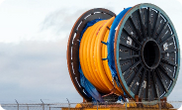MC Cable vs. AC Cable: What Sets Them Apart?

Metal clad cables and armored clad cables are among the most confusing cables on the market. The reason for this is that construction-wise, these cables are more or less similar, and they both feature armor. The main difference between the two types of electrical wiring actually has to do with the grounding rather than the armor. Before focusing on this minor distinction, let's dive into the role that armor has in armored cables.
Why does the cable need armor?
The armor is made of metal in armored cables, such as steel, copper, or aluminum. The goal of the armor is to provide the cable with physical protection from the environment. It mainly protects the cord from physical damage. Therefore, armored wires are only used in environments where mechanical damage is probable.
When it comes to budget, the main advantage of MC and AC cables over general-purpose cables that have no armor is that you save money on the conduit. Since the armor offers the protection the conduit would have offered, you don't need to spend extra on it.
While there is a degree of misinformation on the topic online, armored cables do not protect the cable from the impact of weather, chemicals, and water. In fact, armored wires are susceptible to corrosion and are not corrosion-resistant by default. If you want to use an armored cable in a wet location, you would need a cable with an additional PVC jacket fitted explicitly for wet locations.
What sets metal-clad and armored cables apart?
The main difference between the AC wire and the MC wire is that the metal-clad cable has a standard ground wire, whereas the AC cable relies on a jacket in combination with a wire or thin strip to secure the grounding. The metal armor can also act as a part of the earth grounding in combination with the bonding wire. In type MC cables, the armor is not part of the grounding.
Another difference between MC and AC electrical cables is that AC cables are used indoors and are not suitable for wet and damp locations. The reason for this is that AC cables do not come with PVC waterproof jackets. It is a PVC jacket that makes MC electrical cables suitable for outdoor locations. Unlike MC, AC cables are not rated for direct burial. MC cables are rated for direct burial when they have appropriate jacket and insulation.
AC cables were a predominant type of armored cable on the market long before MC were introduced. They appeared in the National Electric Code NEC as early as 1903. Nowadays, however, MC cables are a more versatile and modern alternative.
If you need an armored cable indoors, AC cable has you covered. Otherwise, opt for a metal-clad cable. At Nassau National Cable, you can get all types of AC and MC cables of unprecedented quality at the best prices in the industry.


















